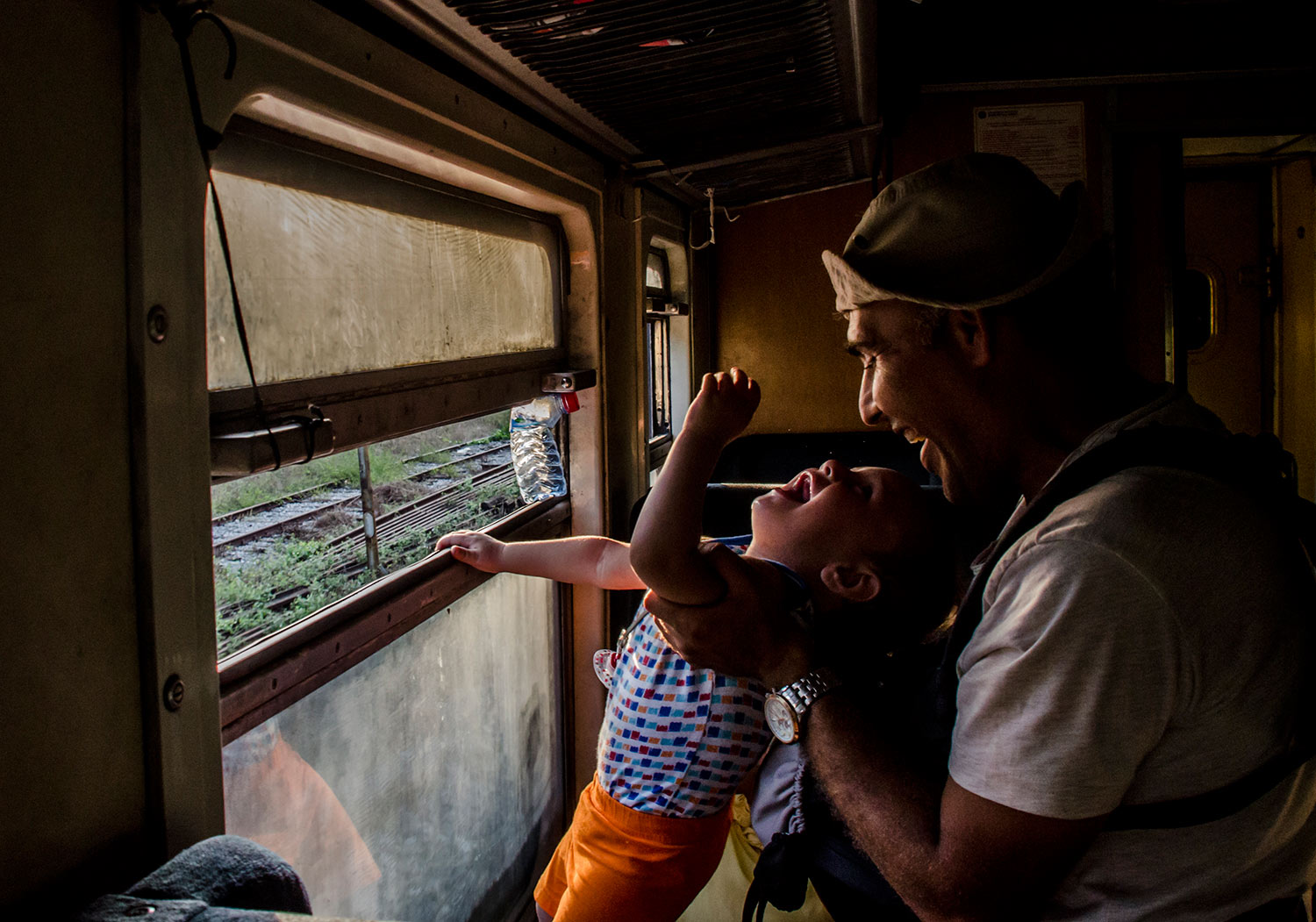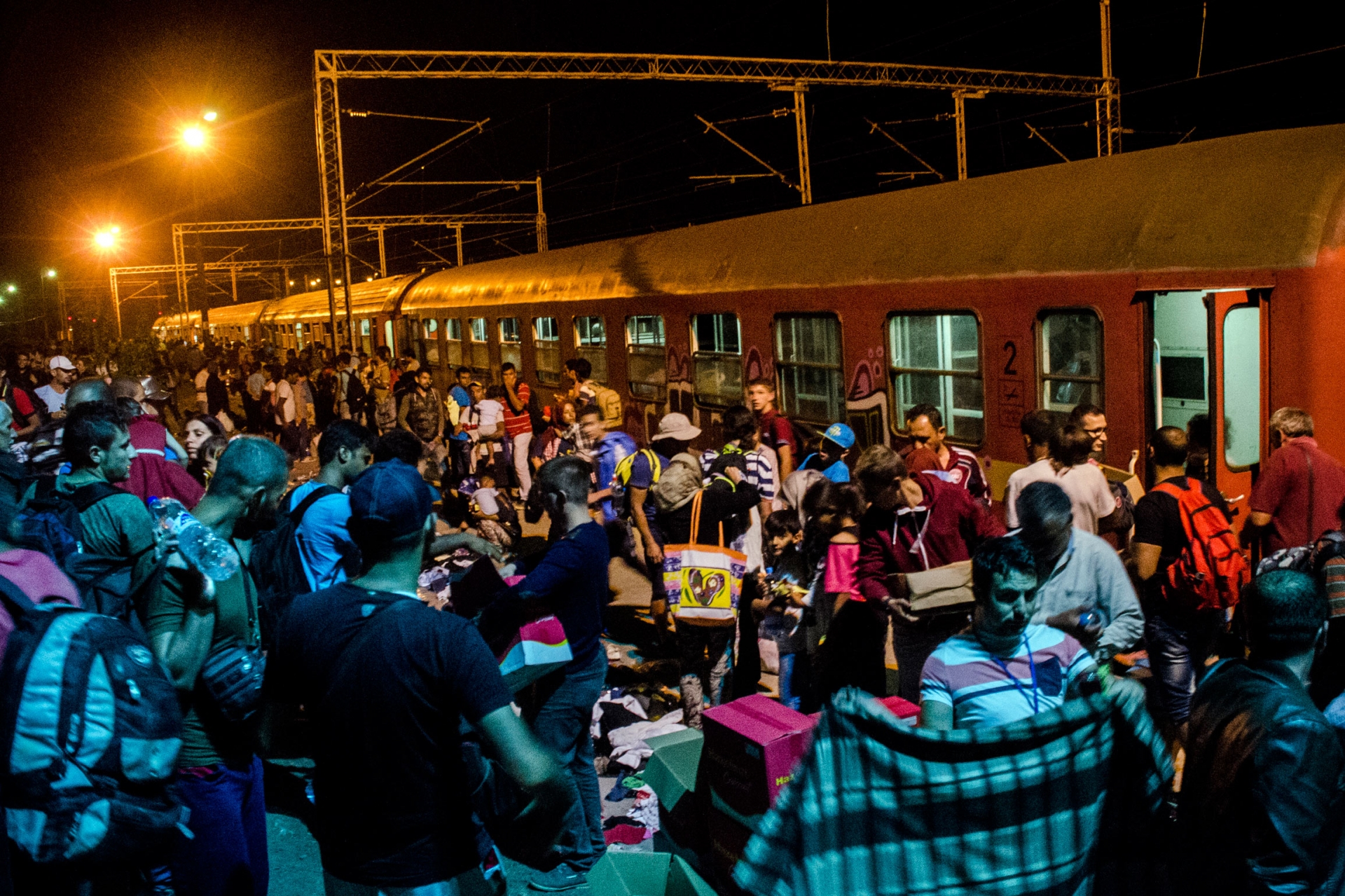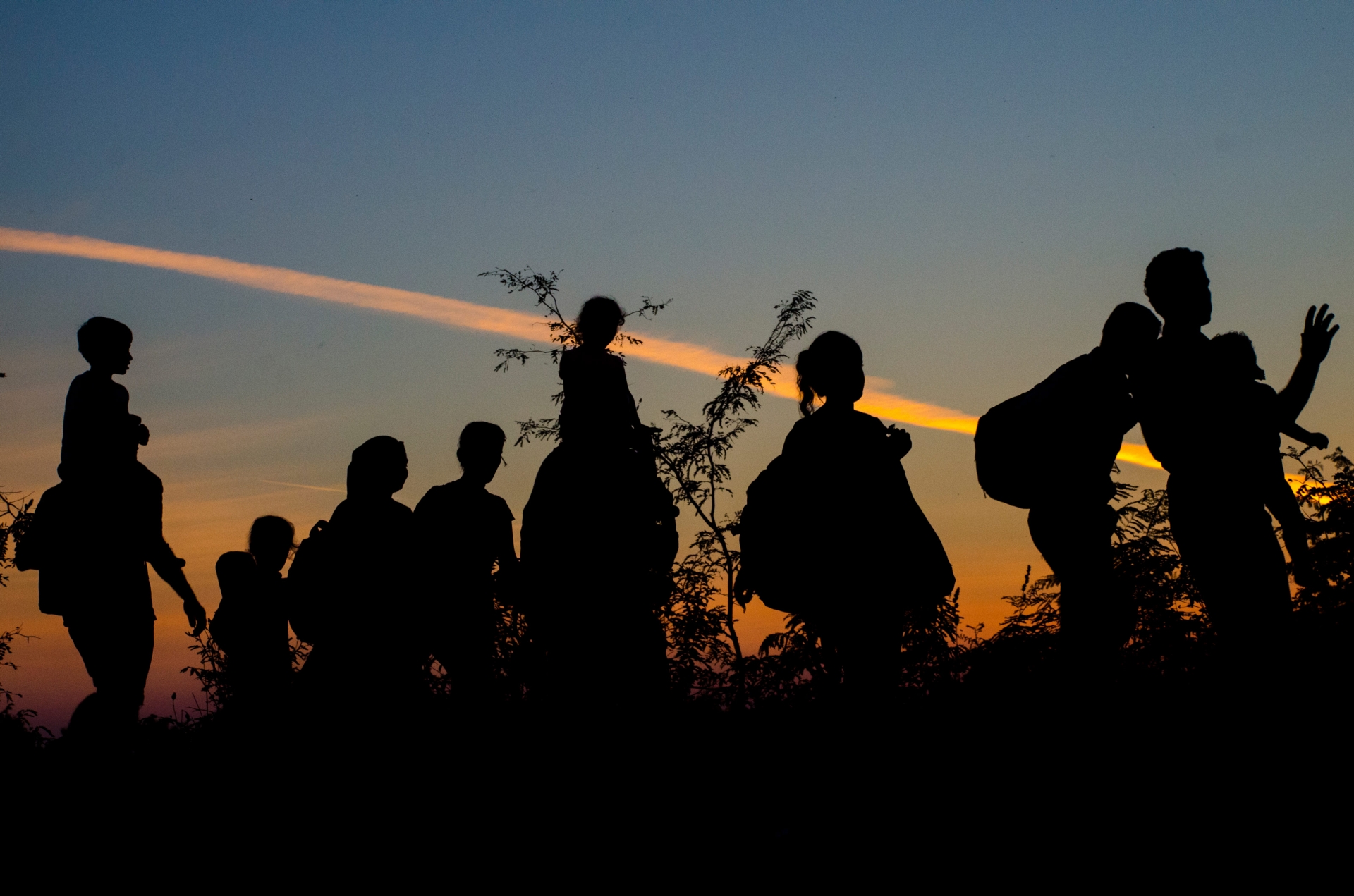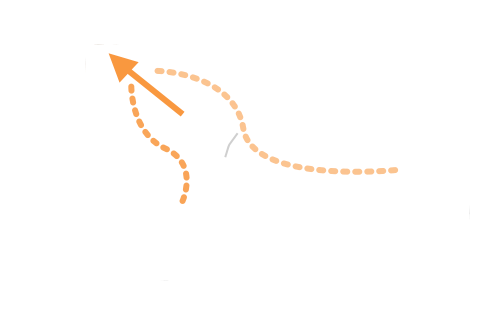On the Tracks of The Orient Express
By: Javier Bauluz
It’s almost impossible to move around on the rickety train as it runs on one of the old Orient Express tracks. Every inch is filled. Youths sitting on the floor pack the aisles. Families take up most of the seats. Children curl up on their exhausted parents and siblings.
The journalist moves by stepping on armrests. The refugees smile at him and make way so he can reach the end of the car. With each step they offer him water and something to eat. As he approaches the platform between two cars, he hears laughter. About 10 children and babies and four middle-aged couples are crammed onto a tiny piece of floor. The older children listen spellbound as the adults trade stories and jokes. They come from different places in Iraq, but they met on the journey and decided to stick together for the company and added security.

Asked how they could be having so much fun despite the fatigue, the anguish and the uncertainty about a destination, one of the women stops laughing, looks at the children and, in a low voice and in perfect English, says, “We do it for them. We don’t want them to suffer what we adults have to suffer. We want them to feel they are on vacation, on an adventure, like a game. Sometimes it’s difficult to keep that up, but that’s what the other adults are for, to give you strength or take care of the little ones when your morale is low. Really, we do everything for our children, so they can grow in peace and have a future that we could not give them in Iraq.”
After awhile, the conversation drops off and one of the mothers, exhausted, falls half asleep with a baby on her lap. One of the men picks up the baby when it starts to cry and rocks it as he looks with tired eyes at the moving landscape through an open door.
In the next car, a father kisses a smiling son who holds on to an open window. As night falls, the train’s poor lighting allows virtually all the tired passengers to surrender to sleep. After putting several grandchildren to sleep, a wide-awake grandmother stares into space.
“¿Barça or Real Madrid?” a couple of Syrian youths playing cards on the floor ask the Spanish journalist. There are big laughs and jokes when the journalist replies: “Messi is the best.” Madrid supporters are in the minority, and the arguments in favor of Cristiano Ronaldo are met with cheerful boos.
“You can’t walk with that busted shoe. Hold on,” says one Syrian youth from Aleppo. After a few minutes he comes back, smiling and with a pair of almost new sneakers. “Try them on. I think we’re the same size.” The surprised photojournalist looks at the shiny, joyful and yet tired eyes of the generous refugee, who carries everything he owns in a small black backpack. “Thanks, but I think it’s better that you keep them. You will need them soon,” he replies, after discreetly looking at the well-worn soles of the Syrian’s shoes. “No, no. Put them on. You’ll see how comfortable they are. With that busted sole, you’re going to hurt your foot and won’t be able to keep walking with us.” The reporter has to think fast to kindly but firmly refuse four more times to accept the shiny sneakers.
A man gets up and “forces” the reporter to take his coveted seat, while he squeezes himself between his sleeping children.
After five or six hours of travel, the train slows and voices announce its imminent arrival at its final destination. The youngest passengers shout, “Serbia!” while mothers and fathers wake up their children and get them ready for the next overnight adventure.
The train stops in the dismal Tabanovce station, dark under a handful of small lights. Hundreds of people get off. They look around, puzzled. “Now what do we do?” they ask themselves. Someone uses a bullhorn to speak in English and Arabic. It’s a young Macedonian volunteer who left a good job months ago to join a group of citizens trying to help the thousands of refugees who arrive every day.
“Before you move on, you can rest awhile, eat and drink anything we have for you here.” Hundreds of water bottles and boxes of food wait on the platform, along with piles of donated clothes. Several volunteers help the refugees. “We cannot allow these people to suffer more than they already do,” says one young woman who does not stop handing out smiles and blankets for the night’s chill.

The hungry and thirsty passengers eat, drink and take clothes for the road, but soon begin to move about restlessly and ask for directions to the Serbian border. The group of Iraqi fathers and mothers bundle up their children, put the smallest on their shoulders and walk into the darkness. We do not see uniformed Macedonian police, but human shadows and the glow of cigarettes hint at the presence of plainclothes police.
Rumors that the border is closed, that there may be bandits ahead, sweep through the crowd. Everyone hurries up. The night is dark and the winding dirt path is barely visible. Less than a mile into the trek, the Iraqis decide to return to the safety of the train station and try again after dawn. A small blanket covers the sleeping children, the parents positioned strategically around them to fend off an attack. The journalist also feels protected by the group, and covers himself with a donated green blanket.
When the sun comes up, the parents help the children tie their shoelaces and the mothers give them milk and crackers. Between jokes, the fathers help each other to strap on their baby carriers and start walking again toward the border.
The group soon leaves the main trail, agreeing that robbers are less likely to lurk around the less busy paths. Through open fields, they head toward a mountain that seems to be in Serbia. At the edge of a dense patch of bushes, the fathers take the lead, armed with clubs to fight off a possible attack. Tensions rise and voices drop as the group walks slowly, checking every spot where the feared bandits might be hiding. Back in an open field, the jokes start again until they spot the silhouette of an armored car ahead, and a group of men in uniform who signal to them. No one knows what will happen.
About 200 yards before the border post, Serb police signal to the group to leave the trail and walk down into a hollow. A barbed wire fence surrounds several tents. People are inside the camp, and a dozen police stand guard outside. Police shout to the new arrivals to enter the camp. No one talks to them. Refugees who arrived the night before say they are not allowed to leave. The new arrivals occupy an empty tent and take the opportunity to rest.
A few hours later, they wake up to screams. On the path, dozens of people are arriving. Soon, it is hundreds, with dozens of children. Police direct the new arrivals to keep walking toward the border. “Go! Go!,” they shout. The parents prepare their children again and join the march. The journalist puts away his camera and walks with the group, the green blanket over his back.
A few miles into Serbia, the refugees see the outline of homes in the small town of Miratovac. The path becomes more difficult for the weakest. The elderly and the children have to stop and rest, and the long column of people begins to stretch out. Some of the Iraqis realize they have become separated from the others. They wait a long time, but the others don’t turn up, and they decide to board buses that take them to the police registration station in Presevo.
Police shove and shout along the lengthy line of refugees waiting to enter the fenced-in center, where they will get papers that allow them to stay in Serbia while they continue their trek toward a new goal: Hungary, the coveted European Union.
A few hours later, screams from the sister of one of the fathers – a smart, brave and cheerful woman – signals a problem. “They abused me. They insulted me and threw us out of the camp, just because we asked for permission to go outside to buy water and food for the children in the shops in front of the camp. We are not dogs. They have no right to treat us like that. We don’t want their papers, we don’t want to stay in this country. We’re going to look for a taxi to take us to Belgrade and then the border with Hungary, even if we have to pay more because we don’t have the police permit.”
In another hour, two cars are ready for the group. They say goodbye to the journalist, almost like a member of the family who is staying behind. “Thanks for walking with us. Thanks for telling the world what is happening to us. We’ll see you in Germany, God willing.”
The journalist tries to find a bus for the trip to Belgrade. After several attempts, he finds one and pays only 25 euros – not the 60 euros demanded of refugees that they’re forced to pay.
Four young Syrians sit on the front seats of the double decker bus. They joke constantly, and they are obviously happy to have completed another stage of their long journey. Three of them tell the same story – one who lived it firsthand and two who heard it from friends. “We were on a boat crossing from Turkey toward Lesbos. An inflatable speedboat approached us, and we thought it was the Greek navy. They were armed and dressed in black, with their faces covered. They threatened us with their weapons, took our gasoline and damaged our motor. We drifted in the middle of the sea. We were really afraid. We thought we were going to die.” The incredulous reporter asks more and more questions, and the versions match up. Some time later, a Human Rights Watch report documents dozens of attacks on refugee boats by armed men in boats.
Hundreds of people sleep in a Belgrade park. Hostels and guesthouses are nearly full, and accept only refugees with Serbian police permits. One of the eight people in a guesthouse explains the next step to the reporter: a bus to Horgos, near the Serbian border with Hungary. From there, they must avoid the police and walk a few miles to Europe.
In a shady spot next to the railroad tracks, children play around a large Syrian family. A greeting in Arabic is met with smiles, fruit and an invitation to join the group. The fathers carry the youngest children on their shoulders, leaving behind the stroller to move faster. The journey continues, between the fear of being robbed and the hope of crossing the last border.
Another family joins, and the sense of safety increases. A cardiologist heads the family. With his wife and three small children, he was forced to abandon his beloved Syria, where he enjoyed a comfortable life. They sold everything they owned and started on the refugees’ journey in search of “a peaceful future for the children.”
Reports that the Hungarian border is about to be shut down makes them walk faster.



